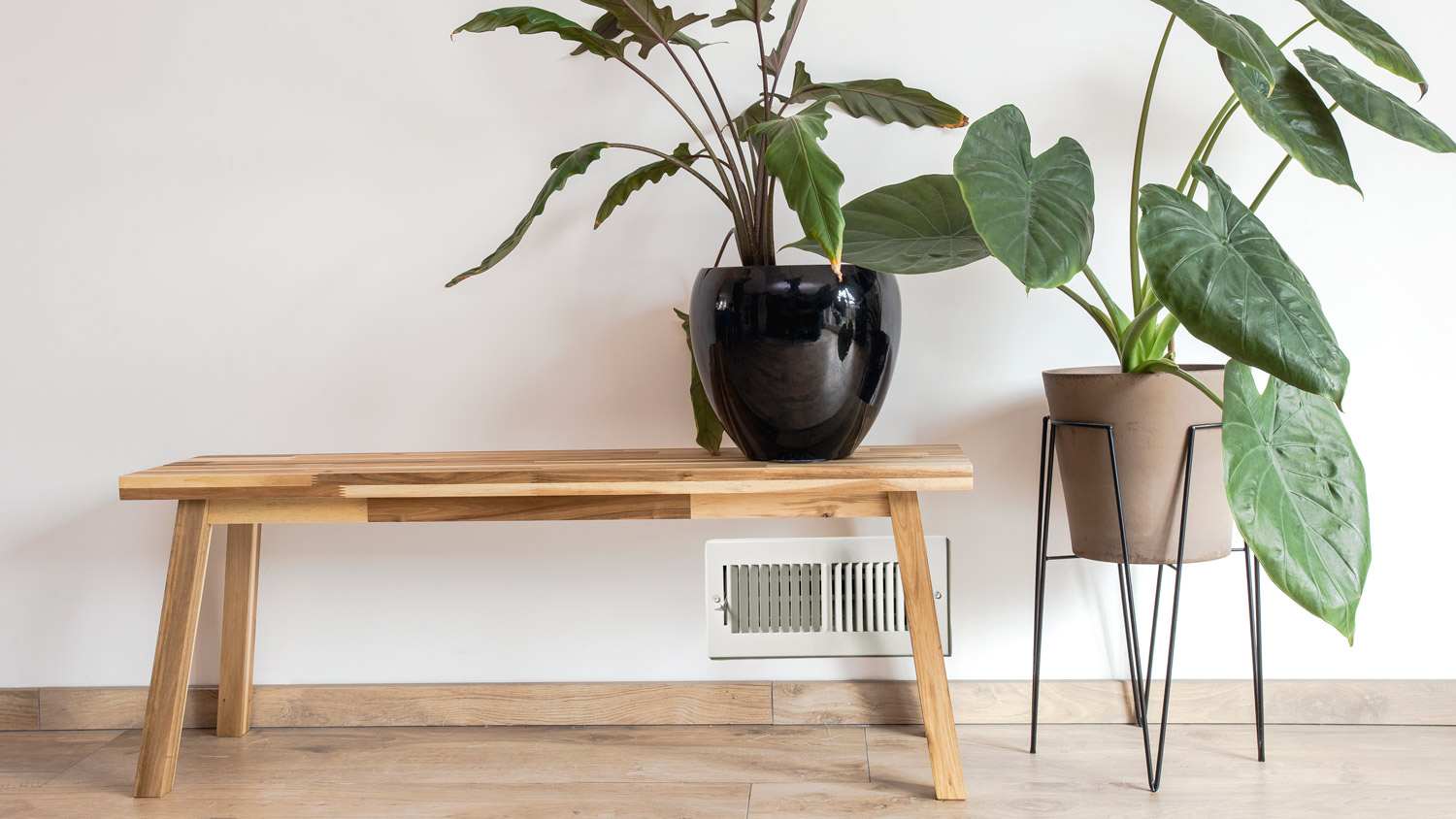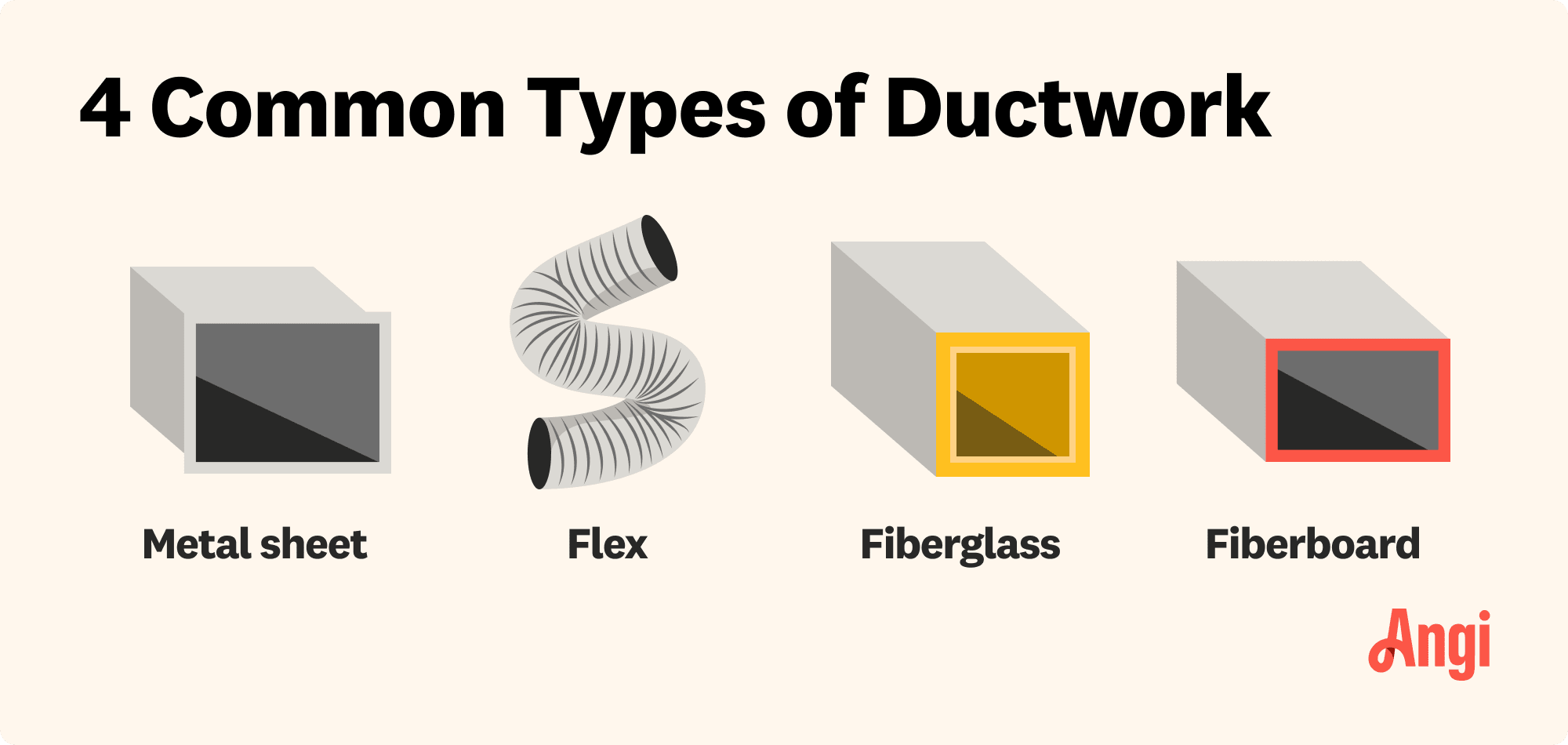
What you’ll pay in Columbus, OH, for furnace repairs depends on many factors. Here’s a breakdown of what can go wrong and the cost to fix those issues.
Air duct replacement in Raleigh, NC costs $283 to $1,487, with an average of $870. You’ll pay more for high-end materials or difficult access points. Reach out to a local HVAC pro for an accurate estimate.


Raleigh’s mix of home styles, including historic bungalows in Oakwood and new construction in North Hills, affects duct accessibility and price.
Flexible ductwork is affordable but less durable in North Carolina’s humid climate, while sheet metal is more efficient but pricier.
New ducts can improve airflow, reduce allergens, and help manage Raleigh’s hot summers and cool winters.
Hiring an HVAC pro in Raleigh costs $75 to $125 per hour.
If your HVAC system isn’t keeping up with Raleigh’s steamy summers or chilly winter nights, your ductwork may be the culprit. Old, leaky, or undersized ducts can waste energy and make your home less comfortable. On average, air duct replacement in Raleigh costs $870, with most homeowners spending between $283 and $1,487. Final costs depend on the size of your home, the type of duct material used, and the complexity of the installation.
Raleigh, NC’s housing stock ranges from historic homes in Five Points to sprawling new builds in Cary, which means duct replacement costs vary widely. Labor, materials, and duct accessibility all influence your final price. Knowing these factors ahead of time helps you budget realistically and avoid unexpected costs.
The size of your home directly affects air duct replacement costs. Larger homes require more materials and labor to replace the entire duct system. On average, the cost ranges from $280 to $700 for a small- to medium-sized home. However, duct replacement can run as high as $1,500 for larger homes. Here’s how the size of your home affects duct replacement costs:
| Home Size (Square Feet) | Average Cost |
|---|---|
| 1,000 | $283–$450 |
| 1,500 | $400–$700 |
| 2,000 | $600–$1,000 |
| 3,000+ | $1,100–$1,487+ |
If only specific sections of your ductwork need replacement, such as in a renovation project, costs will depend on the location of the damaged or worn ductwork. Replacing ducts in hard-to-reach or concealed areas—like attics, basements, ceilings, walls, or crawl spaces—can increase labor costs. Here’s how the location of the ducts could affect their cost:
| Duct Location | Average Cost |
|---|---|
| Crawl space | $300–$500 |
| Attic | $400–$700 |
| Basement (unfinished) | $283–$450 |
| Walls or finished ceilings | $800–$1,487 |

The material you choose for your replacement ducts affects both their cost and longevity. Flexible ducts are commonly used in retrofits across Raleigh, whereas higher-end homes in Cary or North Hills often utilize sheet metal for enhanced efficiency and durability.
Sheet metal ducts are durable but pricey. Flexible ducts, on the other hand, are more affordable but may require repair or replacement sooner. Here’s a breakdown of air duct replacement costs based on duct material:
| Duct Material | Average Cost per Linear Foot |
|---|---|
| Flexible | $5–$7 |
| Fiberglass-lined | $7–$11 |
| Sheet metal | $10–$14 |
You’ll want to hire a local pro for this type of job. Full duct replacement often requires two or more technicians and may take one to three days, depending on the home’s layout and accessibility.
Raleigh HVAC contractors usually charge $75 to $125 per hour, with service calls starting around $100. Costs may increase during summer heatwaves or winter cold snaps, when demand is at its highest. Complex layouts in two-story homes often require more hours.
In Wake County, a mechanical permit is required for duct replacement and HVAC modifications. Permit costs range from $100 to $150 and ensure that the installation meets building and energy codes. Failing to get a permit could cause problems during home inspections if you sell.
North Carolina requires HVAC contractors to be licensed through the State Board of Examiners of Plumbing, Heating, and Fire Sprinkler Contractors. Licensed pros must meet training requirements and carry liability insurance. Reputable Raleigh companies also carry workers’ comp coverage. Always ask for proof before hiring.
Raleigh’s hot, humid summers and cool winters make sealed and insulated ducts essential. Ducts in crawl spaces are particularly susceptible to condensation and mold growth. Local HVAC pros often recommend applying mastic sealant and adding insulation to reduce energy loss and prevent moisture damage.
While your HVAC contractor handles the main ductwork replacement, some Raleigh homes may require additional specialists, depending on their age, layout, and condition. Historic neighborhoods, such as Oakwood or Boylan Heights, often present unique challenges, while newer developments in Cary or Apex may encounter issues with insulation or wiring. Here are some of the additional pros you may need:
General contractors: Many older Raleigh homes were built with plaster walls or finished basements that conceal ductwork. A general contractor can handle demolition, framing, and drywall repair, including situations where ducts need to be accessed through finished areas. This is especially common in renovations of historic properties near Downtown.
Mold remediation specialists: Raleigh’s humid summers and frequent storms can dampen crawl spaces and attics, creating ideal conditions for mold. If an HVAC pro finds visible growth during duct replacement, a mold remediation team should be brought in before new ducts are installed to prevent air quality issues.
Insulation contractors: Proper duct insulation is critical in the Triangle, where hot summers and cool winters put heavy demand on HVAC systems. Homes in suburbs like Wake Forest or Holly Springs often have ducts running through attics or crawl spaces, where insulation can dramatically reduce energy loss and lower utility bills.
Electricians: In some Raleigh homes, especially newer builds with smart HVAC systems, ducts may run near electrical wiring or automated controls. An electrician ensures wiring is safely rerouted or integrated without interfering with duct placement or airflow.
Asbestos abatement teams: Homes built before 1980 in Raleigh neighborhoods like Mordecai or North Hills may have more than just dirty air ducts—there could be asbestos insulation on or near ducts. If suspected, state law requires a licensed asbestos abatement team to remove the material before work can proceed safely.
New ductwork may not directly increase your home’s appraisal value, but it can boost appeal for Raleigh buyers who prioritize energy efficiency and comfort. Updated ducts should improve airflow, lower bills, and enhance indoor air quality—features that stand out in competitive markets such as Raleigh.
For historic homes near downtown Raleigh, replacing outdated ductwork can also reassure buyers who are concerned about potential hidden maintenance issues. The result: a home that feels newer, more efficient, and easier to maintain.
Home is the most important place on earth, which is why Angi has helped more than 150 million homeowners transform their houses into homes they adore. To help homeowners with their next project, Angi provides readers with the most accurate cost data and upholds strict editorial standards. We survey real Angi customers about their project costs to develop the pricing data you see, so you can make the best decisions for you and your home. We pair this data with research from reputable sources, including the U.S. Bureau of Labor Statistics, academic journals, market studies, and interviews with industry experts—all to ensure our prices reflect real-world projects.
Want to help us improve our cost data? Send us a recent project quote to [email protected]. Quotes and personal information will not be shared publicly.
From average costs to expert advice, get all the answers you need to get your job done.

What you’ll pay in Columbus, OH, for furnace repairs depends on many factors. Here’s a breakdown of what can go wrong and the cost to fix those issues.

Repairing ductwork in a crawl space is frustrating and difficult, which is reflected in the cost. Learn why limited access results in a premium cost beyond just a simple increase in labor hours.

Heating and cooling system on the fritz? Discover the factors that go into HVAC repair costs and how you can save money on this crucial home update.

If you’re thinking about an alternative to a traditional HVAC system, you may want to consider a heat pump. Read on for more about heat pump systems.

Ductwork losing energy? Here are six duct sealing methods that will help you get some big savings on your monthly energy bills.

What size heat pump do I need? Learn the various heat pump sizes and how to calculate which size is best for your home.